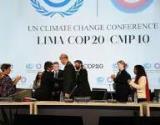Social Watch news
Published on Tue, 2014-12-23 09:28
For the fourth successive year, a delegation of human rights and development civil society organizations from the Arab region will be visiting the European institutions in Brussels between the 8th and the 12th of December 2014. The Arab delegation includes civil society representatives from Egypt, Jordan, Palestine, Morocco, Syria, Tunisia and Lebanon.
This visit seeks to provide a platform for dialogue and exchange between civil society organizations from the Arab region and European policy makers at the Parliament and Commission around the EU’s support and involvement in the region.
|
Published on Sat, 2014-12-20 23:00
In a letter to the World Bank President Mr Jim Kim, 28 UN human rights thematic mandate-holders conveyed several concerns regarding the World Bank’s latest draft of its Social and Environmental Safeguards.
The Bank is embarked in a process to reform and streamline its Safeguard policies, process which Mr Kim had earlier promised will not lead to their dilution.
Referring to the draft Bank document, however, the letter stated that “by contemporary standards, the document seems to go out of its way to avoid any meaningful references to human rights and international human rights law.”
|
Published on Fri, 2014-12-19 10:46
The most important and most fought over outcome of the UN Climate Conference in Lima was a decision adopted by the Conference of the Parties (COP) which the Peruvian Minister in charge of the conference termed ‘The Lima call for climate action’.
This COP decision relates to the work of the Durban Platform, which is the track in the UN climate negotiations that leads to an expected new climate change agreement in Paris at the end of 2015.
|
Published on Thu, 2014-12-18 19:05
 |
An unapologetic Dutch blogpost by the chair of the Dutch YPFDJ, Meseret Bahlbi, gives an indication of the urgent need for a sober and realistic benchmarking of a process of change in Eritrea, which is heralded in some quarters. The YPFDJ is the youth wing of Eritrea’s only allowed political party. It has an active membership that actively sends out the messages of the party. Unashamedly Bahlbi is expressing the position of Eritrea’s Minister of Foreign Affairs Osman Saleh who called for an urgent review of European migration policies towards Eritreans. According to Minister Saleh these are “to say the least, based on incorrect information”. Bahlbi makes similar claims, suggesting further that his views are vindicated by a recent Danish report. Offering contradictory arguments, this report by the Danish Migration Service suggests returning Eritrean migrants home because of current changes in Eritrea.Human Rights Watch has criticised the report as deeply flawed. Meanwhile the Danish Migration Service has publicly expressed doubts on the content of its report.
|
Published on Thu, 2014-12-18 17:41
In 2011, Olivier de Schutter, then UN Special Rapporteur on the Right to Food cautioned, “The commodification of land, which the global phenomenon of land-grabbing is accelerating, entails risks that go far beyond what the current proposals for regulating it seem willing to recognize.” The risks he alluded to stem from treating land, labour and money as mere tradable commodities and allowing market mechanisms to be the sole arbiter of society, culture and nature. Adequately addressing them would require subordinating markets to the interests of society and the natural environment, recognizing non commoditized valuations of land and nature in ‘official’ governance discourse and practice, and putting in place national and international regulations that stop rather than encourage land grabbing.
|
Published on Fri, 2014-12-12 21:51
Corporations should be carefully vetted for their fiscal responsibility and human rights record before being allowed to use the UN name and logo or join any partnership with the international organizations, argued Roberto Bissio, from the Social Watch secretariat during a panel on global economic governance on December 11 in New York.
Former US congressman Barney Frank, co-author of the Frank-Dodd Act to regulate financial corporations, passed after the 2008 global crisis, was a panel member and agreed with many of the points raised by civil society organizations.
The panel also included Chilean Ambassador Eduardo Gálvez, who defended a central role for the UN in global economic governance, an IMF executive director, and representatives of the US Treasury and of the UN Office on Drugs and Crime.
|
Published on Fri, 2014-12-12 09:10
China will remain as a developing country in the UNFCCC framework and will remain in the Like-minded Developing Countries group (LMDC) as well as the more general grouping of developing countries, according to the head of the Chinese delegation, Su Wei, taking part in the Conference of the Parties that opened in Lima on Monday.
Su Wei made this confirmation in answer to a question during a side event on “Perspectives on the 2015 Paris deal: Options on the road from Lima to Paris” organised by the Third World Network and the South Centre at lunch time at the Conference Centre on the first day of the COP20.
|
Published on Fri, 2014-12-12 07:20
In 2020, will 2014 seem like a turning point in the way the human rights system began to properly adapt to the challenges posed by the modern economy? In June this year the Human Rights Council passed a resolution establishing a new intergovernmental working group to establish a treaty to address corporate-related human rights violations. Before last week’s third UN Forum on Business and Human Rights a member of the pre-existing UN Working Group on Business & Human Rights – whose members have so far been silent on the June – is now supportive of the development of a treaty.
|
Published on Fri, 2014-12-05 23:00
The principle of common but differentiated responsibilities (CBDR) is considered one of the key achievements of the UN Conference on Environment and Development in Rio de Janeiro in 1992. Twenty years later, this principle has become a focal point of current negotiations on climate change and the post-2015 agenda. The developing countries that make up the Group of 77 want to preserve the principle unchanged. However, the US, EU and other industrialized countries want to do away with it in its present form. They argue that global power structures have changed. In their view, fair burden sharing must include contributions to climate protection from emerging economies like China, India and Brazil. "If consensus cannot be found, there will be neither a new global climate treaty nor a global development agenda worthy of the name in 2015" writes Global Policy Forum's director, Jens Martens.
|
Published on Fri, 2014-12-05 19:42
The annual United Nations climate treaty conference kicks off in Lima, Peru, against the backdrop of several key events in the climate change arena.
These include the most recent release of the Intergovernmntal Panel on Climate Change's Summary for Policy- Makers relating to the Synthesis Report of its Fifth Assessment Report, the US-China joint announcement of their post-2020 actions on climate change, and the US$9.7 billion pledged to the Green Climate Fund.
|
SUSCRIBE TO OUR NEWSLETTER
Submit

|









